Ah, tacos. Who doesn’t love ’em? A hard shell or a soft corn or flour tortilla can be the perfect, handheld vessel for any number of fillings. With the simplest of ingredients (black beans, lettuce, tomatoes) to the more unique (lamb, goat), local restaurants are making some damn-good, flavor-packed delights. We’ve asked a few folks to share their favorites. Read on, and you’ll see why every day can be Taco Tuesday in Memphis.
Fried Fish and Shrimp Tacos at Elena’s Taco Shop
Kim Vodicka — poet
This is tough because, though I love the tacos at pretty much any hole-in-the-wall restaurant or busted-ass taco truck on Summer Avenue, I wanna say Elena’s is my fave just because it stands out the most. It’s a totally different thing because it’s beach tacos, but like wow the fried fish and shrimp are excellent, especially if you get decadent and combine the two on one taco.
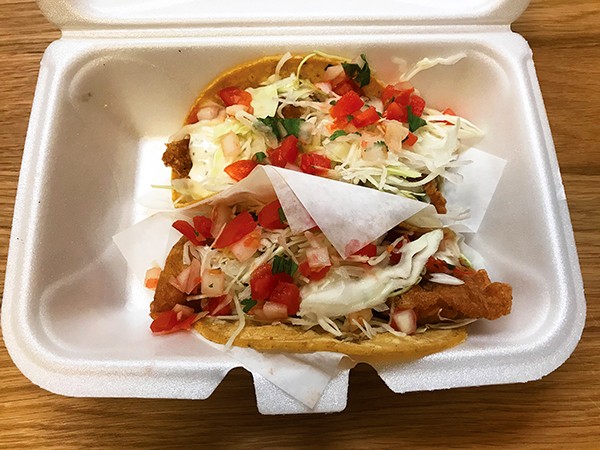 Jesse Davis
Jesse Davis
Their tacos remind me of the ones I had on tour in San Diego a few years ago, which were exceptional.
Maybe the best part of the whole thing is they have, like, 17,000 sauces to choose from. Pre-virus, they would set the sauces out on their own little buffet-like setup, and that’s really what made me fall madly in love. I am a fool for some sauce.
Elena’s Taco Shop is at 6105 Summer Avenue; 417-7915
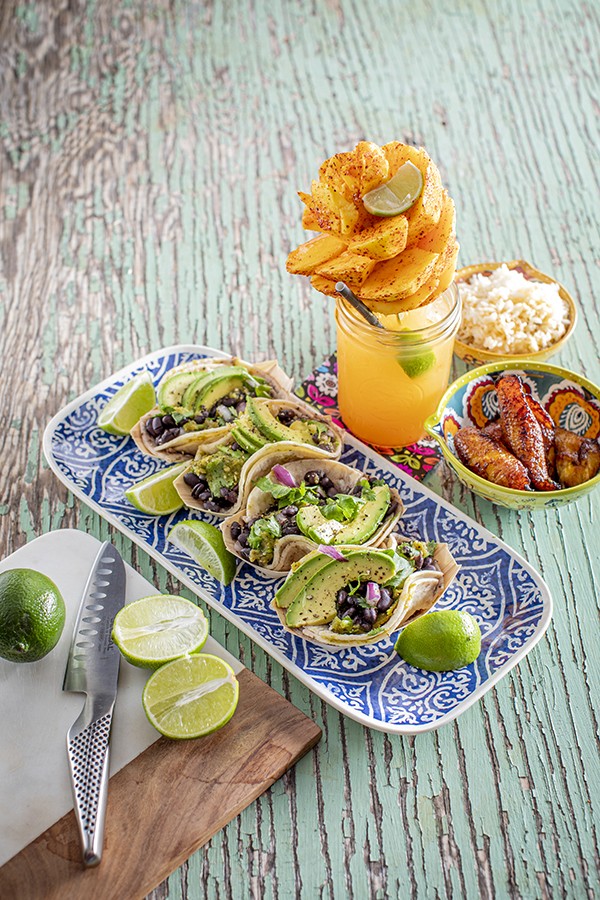 Justin Fox Burks
Justin Fox Burks
Juan’s Tacos with Black Beans at Global Café
Justin Fox Burks — cookbook author, food blogger, photographer
There’s no magic tricks, no smoke, and no mirrors involved in this straightforward dish, and with just five ingredients, there’s nowhere to hide. Juan’s Tacos ($8.95 for four vegan tacos) feature perfectly seasoned vegan black beans inside a double layer of super-soft corn tortillas. These stellar tacos are topped with spicy house-made tomatillo salsa, red onion, and fresh cilantro. Ask them to add avocado because … avocado.
Don’t sleep on the fried plantains and a side of rice to round out your meal. If you want something “wow” to wash it all down, you can’t beat The Messy MangoRita (also a Juan specialty), which features a whole dang mango doused in hot sauce as a garnish. And hey, it’s all vegan, too!
I’m the Chubby Vegetarian, and I approve this taco.
Global Café is at 1350 Concourse Avenue, Suite 157; 512-6890
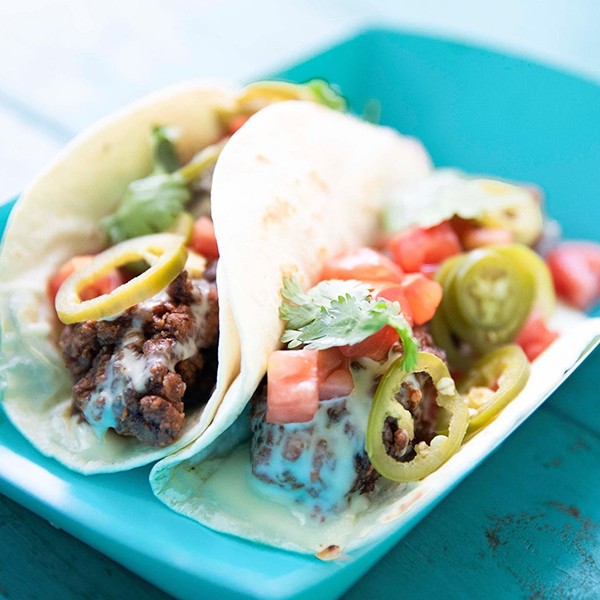 El Mero Taco/Facebook
El Mero Taco/Facebook
Fried Chicken Taco at El Mero Taco
Cristina McCarter — owner, City Tasting Tours
My favorite taco is the fried chicken taco from El Mero Taco. It’s the combo of juicy fried chicken and that damn queso with that pop of fresh jalapeño pepper for me. It’s tacos like that that I will randomly crave. You know it’s good if you drive to the ‘Dova for it. But they are in my neighborhood a lot, too. So I’ll grab a six pack of beer while picking up my tacos and brisket quesadilla. Now I want a taco!
El Mero Taco is at 8100 Macon Station #102, Cordova, or elmerotaco.com/foodtruck; 308-1661
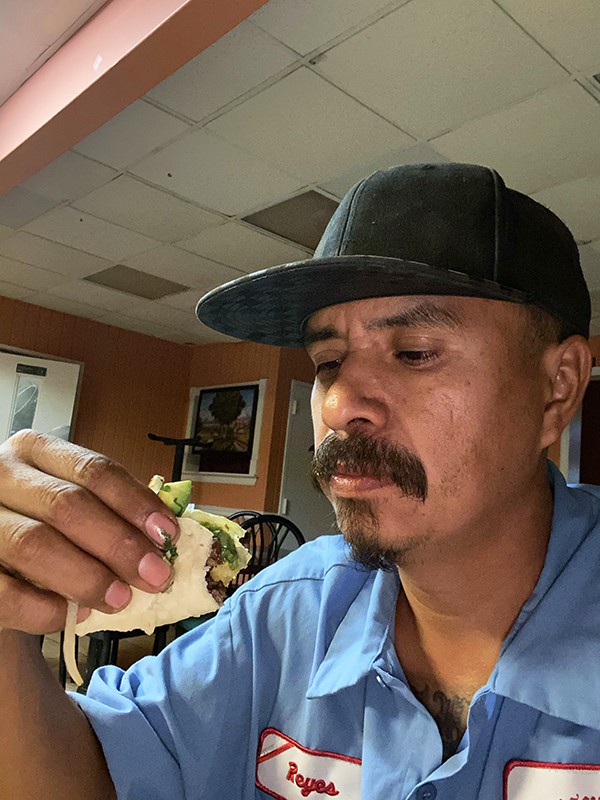
Enrique Reyes with the asada taco from La Guadalupana
Asada Taco at La Guadalupana
Enrique Reyes — Mexican wrestling promoter
The asada taco at La Guadalupana Mexican restaurant is Enrique Reyes’ favorite taco when he and his wife go out to eat.
“La Guadalapuna is my favorite restaurant,” says Reyes, who organizes La Lucha Libre wrestling matches in Memphis, as well as makes the colorful masks worn by wrestlers. “The food is so delicious there.”
He likes to eat at home. “My girl cooks for me, but when she doesn’t cook, I go straight to La Guadalupana … once a week, something like that.”
Carne asada, Mexican steak, is his favorite dish there, but if Reyes orders a taco, it’s the asada taco, which is “just steak and onions and cilantro.” He puts guacamole on top, “’cause that makes the difference in the flavor.”
Asked how many he eats at a time, Reyes says, “Really, only four. You order with guacamole, it makes it a little bigger. I don’t eat too much. I’m good with four tacos.”
And Reyes doesn’t use any utensils when he eats tacos. “Just pick it up like a real Mexican. You never eat tacos with a fork.” — Michael Donahue
La Guadalupana is at 4818 Summer Avenue; 685-6857
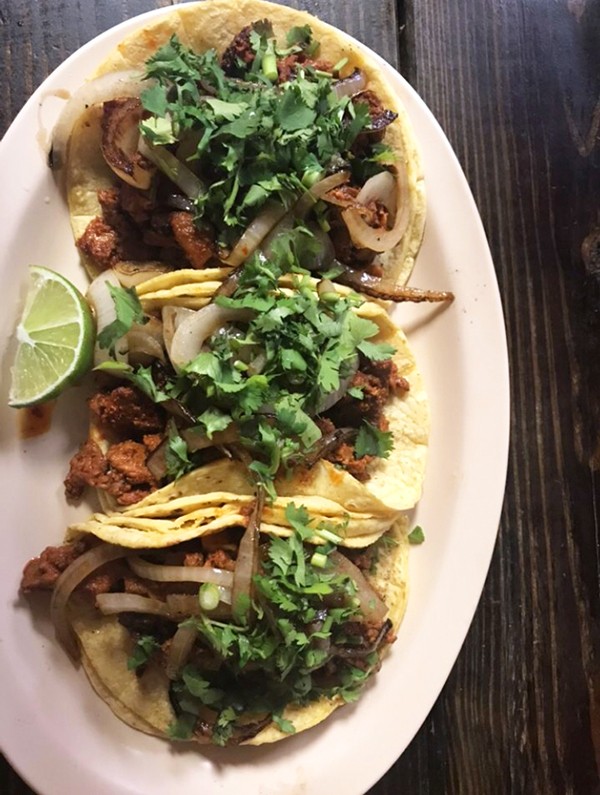 Colin Butler
Colin Butler
Al Pastor Taco at Picosos
Colin Butler — DJ for Big Ass Truck, radio DJ on WYXR at Crosstown Concourse
I’m partial to the tacos al pastor at Picosos. Pastor, I think it means “shepherd’s style.” Basically, they grill that pork on a spit, like gyro meat, and they slice it off. It’s based on lamb shawarma brought by Lebanese immigrants to Mexico. So some of the spices used in al pastor include coriander, hot pepper corns, cumin, chiles, garlic. They marinate the meat in that and then they pile it up on a spit and it rotates and cooks.
They hand-make their own corn tortillas there. And they use double tortillas. They stuff that full of meat, and then use chopped onion, cilantro, and jalapeño, which is typical for street tacos.
Between the homemade tortillas, doubled, the flavor of the meat, and the fresh toppings, to me, they’re the best tacos in town. It comes with your typical red salsa, a badass salsa verde, and more of a smoky, kind of chili-based sauce. They’ll give you all three if you ask for them.
It’s super simple. They’ll give you a small bowl of limes, too. And I always ask for crema, like sour cream but different. I like the way the sour cream contrasts with the more acidic stuff.
Picosos is at 3937 Summer Avenue; 323-7003
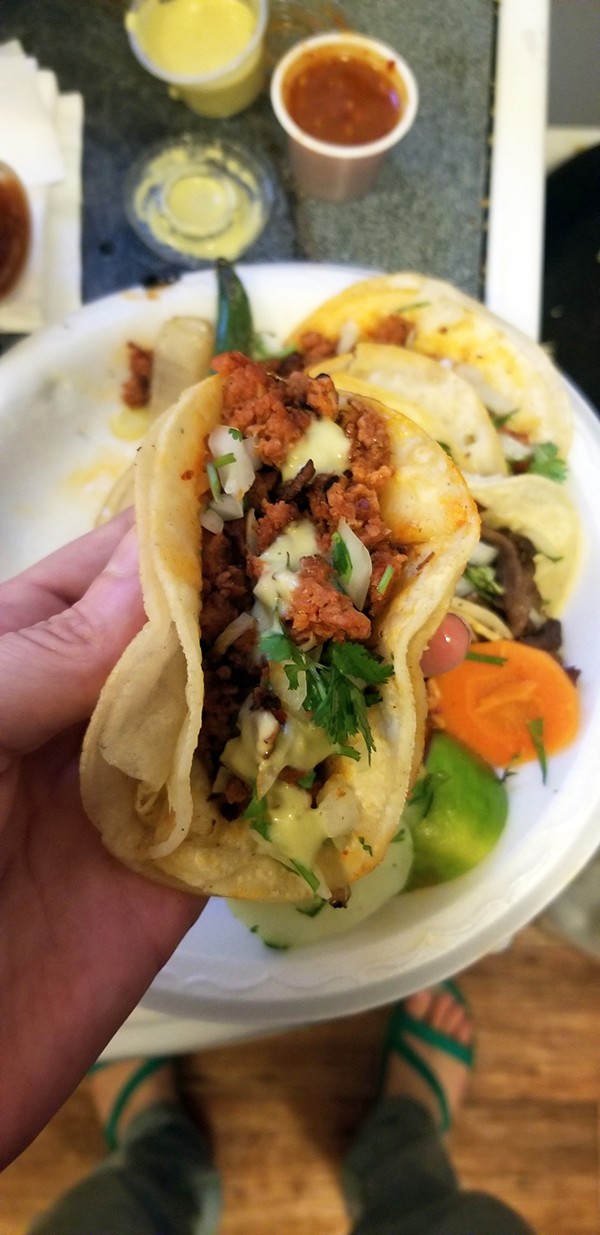 Katrina Coleman
Katrina Coleman
Chorizo Taco at Tacos El Gordo
Katrina Coleman — comedian
I haven’t left my house much, lately. Working from home, I depend on my husband to bring treasures from the Outside. One day, he came home with five street tacos from Tacos El Gordo. The beef and chicken were good, but Memphis, THE CHORIZO.
On Madison, the lot of the Marathon has an orange box on wheels. I been sleepin’ on it.
Grilled corn tortillas filled with meat, onions, and cilantro. Served with cucumber and carrot slices that are pickled so lightly, it seems as if they heard of the concept once in a dream. The red chile sauce is good, but the green will light you up like Montag himself decided you were obscene. The sausage inside is perfectly seasoned. Tossed on the grill with the onions, the texture of the tortilla and minimal crisp of the meat makes such a delightful chewing experience that one might consider that no other food has ever been good.
If you haven’t been, I have to say: WAKE UP, SHEEPLE. Treat yourself to the only chorizo ever to be perfect.
Tacos El Gordo is at 1675 Madison Avenue; 801-0936
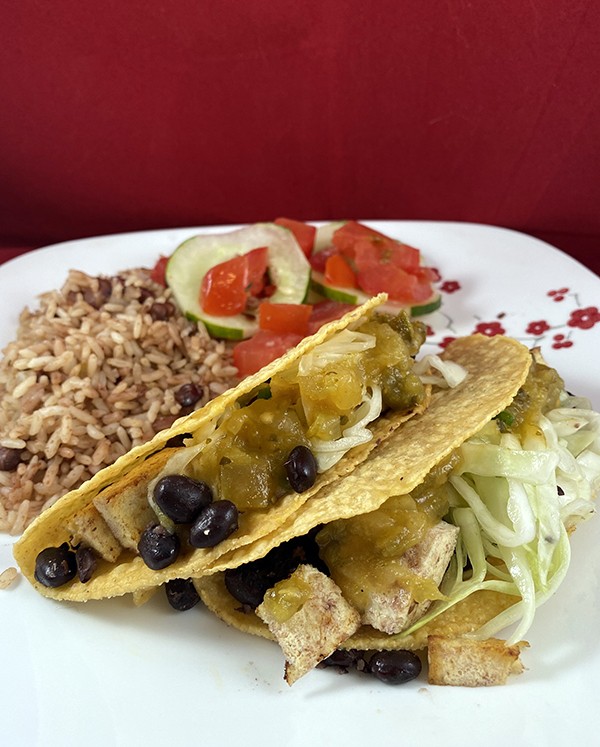 Bianca Phillips
Bianca Phillips
Black Bean Tacos at Evelyn & Olive
Black Bean Tacos at Evelyn & Olive
Bianca Phillips — communications coordinator, Crosstown Arts
This year has been a wild one, and if there was ever a time to make sure you’re putting the cleanest, most wholesome food into your body, it’s now. Greasy comfort food may be calling, but whole-food, plant-based options will provide the nutrition you need to keep your immune system strong.
Lucky for you, the black bean tacos at Evelyn & Olive are both healthy and comforting. They’re like the taco equivalent of a grandma hug, which you can’t get right now thanks to social distancing, so accept a hug in the form of a vegan taco instead. Two crispy taco shells are generously stuffed with seasoned black beans, sautéed tofu, crunchy cabbage slaw, and sweet-and-tangy kiwi salsa. They’re served with sides of fluffy Jamaican rice and peas and cool, refreshing cucumber-tomato salad.
Evelyn & Olive is open for dine-in or takeout, and when you order to-go, they thoughtfully package all the taco components separately so you can avoid the dreaded soggy takeout taco. Build your own tacos at home, queue up Bob Marley’s “Three Little Birds,” and enjoy with a stiff Jamaican rum punch for maximum comfort effect.
Evelyn & Olive is at 630 Madison Avenue; 748-5422
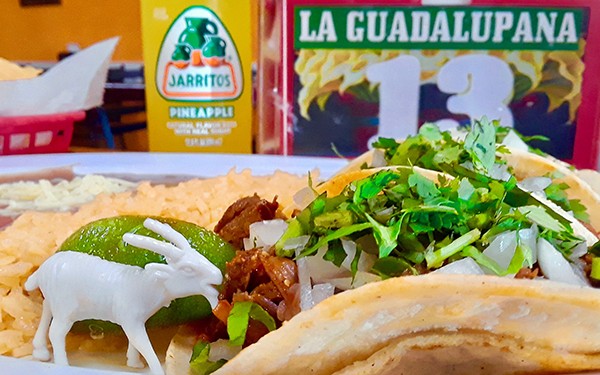 Julie Ray
Julie Ray
Goat Taco at La Guadalupana
Noelia Garcia — associate artistic director at New Ballet Ensemble and School
Happy goats perform dramatic joyous dances to the glee of onlookers — much like the fancy footwork of a Spanish dancer. Perhaps the secret to Noelia Garcia’s dance superpowers is the $2.75 goat taco at La Guadalupana.
Garcia is the associate artistic director at New Ballet Ensemble and School who studied Spanish dance and flamenco at the Institut del Theatre i Dansa de Barcelona. She lived and worked in Spain, performed throughout Europe, in China, Israel, and the Philippines, and was a founding member of Barcelona’s Increpacion Danza company before landing in Memphis nearly 20 years ago. Her favorite taco is a heaping pile of perfectly seasoned goat meat on two soft corn tortillas topped with onions and cilantro. The meat of this beast has the tender juicy texture of a pot roast with a delightful tangy taste.
Try it. Ewe’ll like it. — Julie Ray
La Guadalupana is at 4818 Summer and 8075 Cordova Road; 685-6857
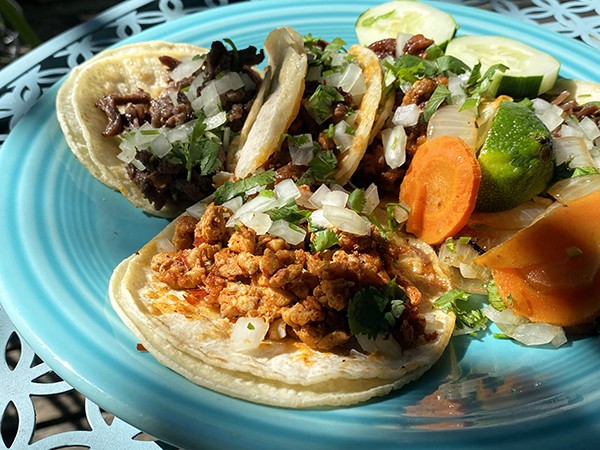 Laura Jean Hocking
Laura Jean Hocking
Al Pastor Taco at El Burrito Express
Al Pastor Taco at El Burrito Express
Laura Jean Hocking — filmmaker
“For so long, I thought tacos only had hard shells, and had cheese and sour cream in them,” says filmmaker Laura Jean Hocking. “But a street taco, or a food truck taco, is all about the quality of the protein. It’s this little showcase for meat or chicken or fish with accents, instead of gloppy, Americanized crap all over it.”
Hocking’s favorite Memphis taco truck is El Burrito Express. Ubalto Guzman started the business six years ago. “I used to be a contractor,” he says. “We moved from California to Memphis to get into the food business. This is a family business. It’s me and my wife, son, and daughter.”
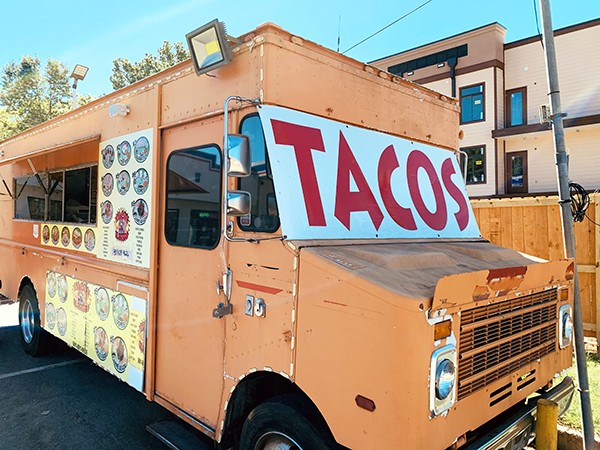 Laura Jean Hocking
Laura Jean Hocking
An El Burrito Express taco plate includes five tacos with your choice of meat. Hocking’s favorite is al pastor, marinated pork said to descend from shawarma brought to Mexico by 19th century Lebanese immigrants.
“I like al pastor because I’m a big pineapple fan. I love the subtleness of the pineapple in pastor. It’s very savory and juicy. It’s a new discovery for me. I had never had pastor until we went to L.A. in September 2019. Generally, I’m a pescatarian, but when I run into meat products that are very good, like a Soul Burger or some Bar-B-Q Shop glazed ribs, I’ll have them. Now, pastor is on the list because life is short.” — Chris McCoy
El Burrito Express is at 1675 Madison Avenue; 428-9626
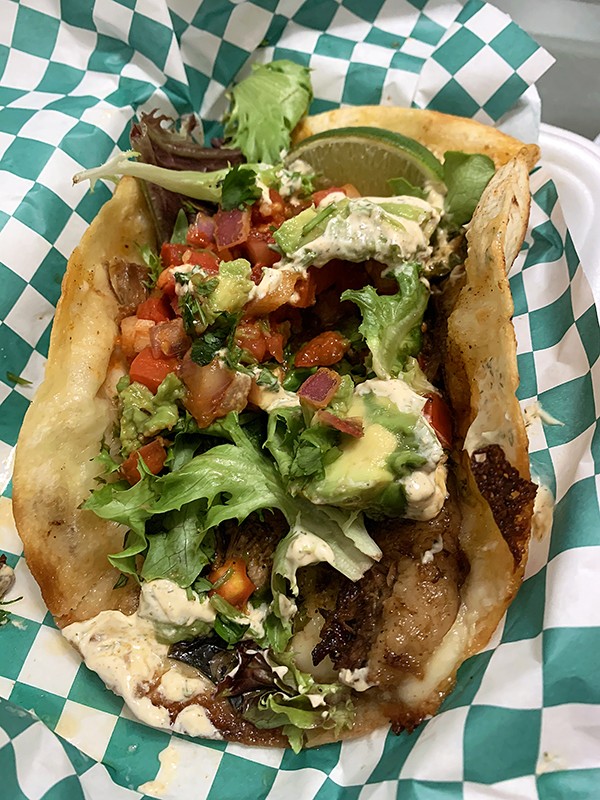 Samuel X. Cicci
Samuel X. Cicci
Smoked Brisket Taco at Elwood’s Shack
Cara Greenstein — food and lifestyle blogger
Stretching or, as I would argue, elevating the definition of a “taco,” Elwood’s Shack delivers a singular sensation you simply can’t miss on its menu: the smoked brisket taco.
Upon placing in the pizza oven, a single flour tortilla puffs into a pillowy yet crispy foundation for an unconventional combination of delicate field greens (no shredded iceberg to be found here), sliced avocado, pico de gallo, shredded mozzarella, and creamy horseradish. A generous portion of smoked brisket, a perfected in-house recipe that takes center stage across Elwood’s menu, brings this open-faced phenomenon back to its barbecue Memphis roots.
If you ask how many tacos come in an order at the counter, don’t be underwhelmed when they tell you “one.” One taco from the Shack is just right.
Elwood’s Shack is at 4523 Summer Avenue; 761-9898
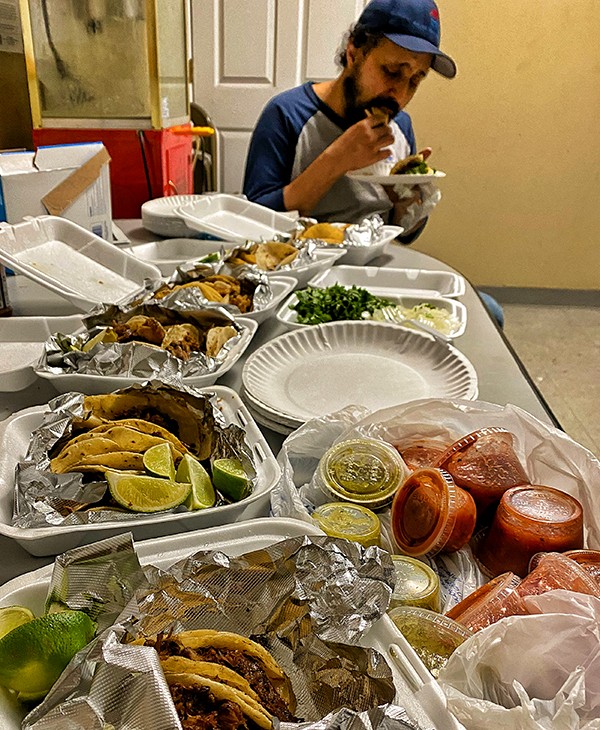 Jon W. Sparks
Jon W. Sparks
Barbacoa Lamb Taco at Tortilleria La Unica
The workers of R.E. Michel Company — HVAC distributors
Tortilleria La Unica recently moved across the street to its new home at 5015 Summer in a one-time Wendy’s. It still has the Mexican fare that made it popular, particularly among the working people out in that area. Among those is the crew at R.E. Michel Company, a distributor of HVAC equipment. One of the bunch is Dave Godbout, a self-described Destroyer of Tacos who is particularly fond of La Unica’s offerings. A recent lunch spread at the warehouse had half a dozen varieties from chicken to beef to lamb to pork.
“It’s a perfect combination of food,” Godbout says. “You’ve got salsa with tomatoes that has lycopene in it. You’ve got cilantro, which is good for detoxifying. You got a little bit of fat, a little bit of protein, a lot of carbs. It’s the perfect street food, and especially in our area, it’s the most readily available food you can get.”
“I love tacos, Americanized, authentic, it doesn’t matter,” says manager James Hoffman. “I didn’t even like cilantro until I got older and now I love it more and more. And we do a lot of business in the Hispanic community and they send us tacos from their local taco truck all the time. Man, this lamb taco is really good!” — Jon W. Sparks
Tortilleria La Unica is at 5015 Summer Avenue; 685-0097
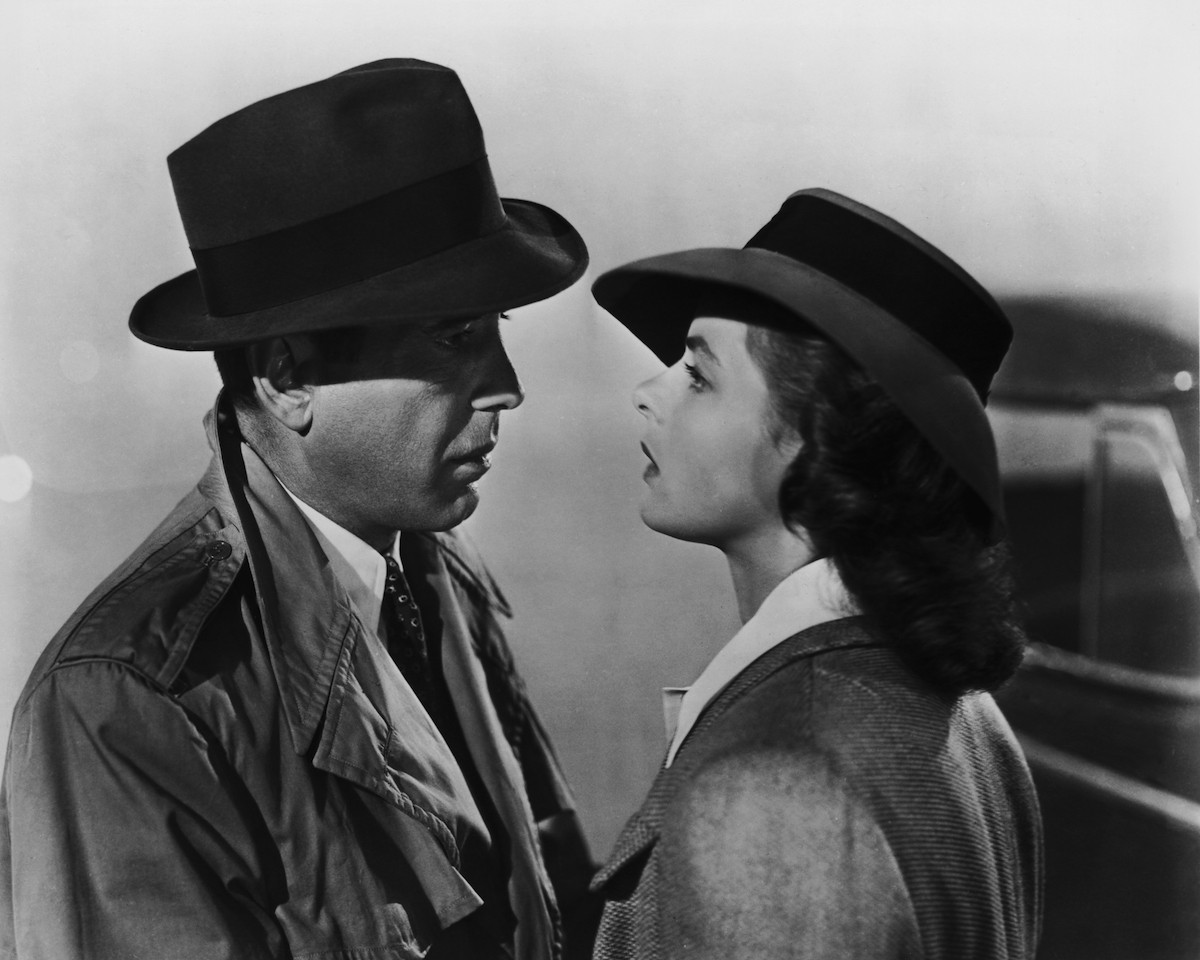
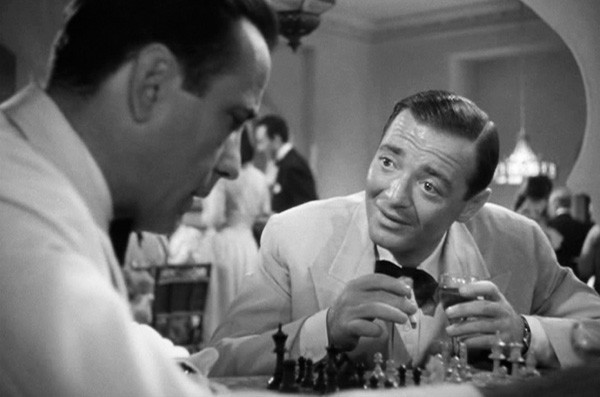
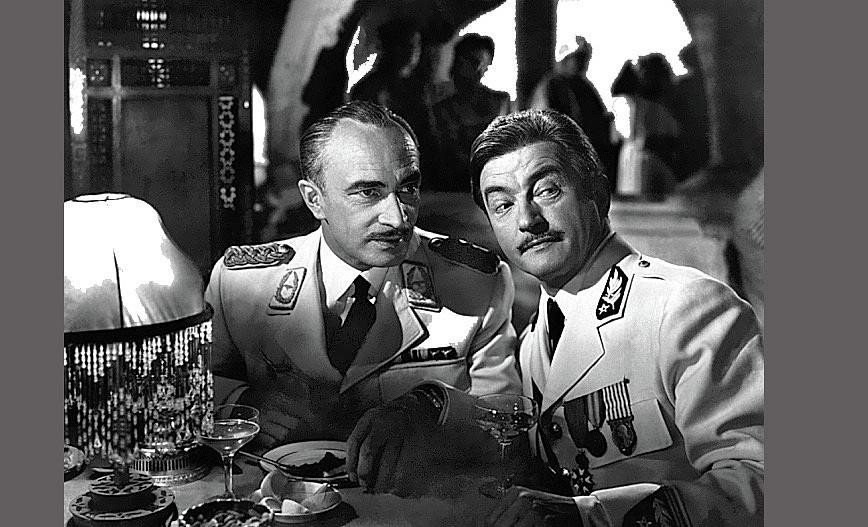
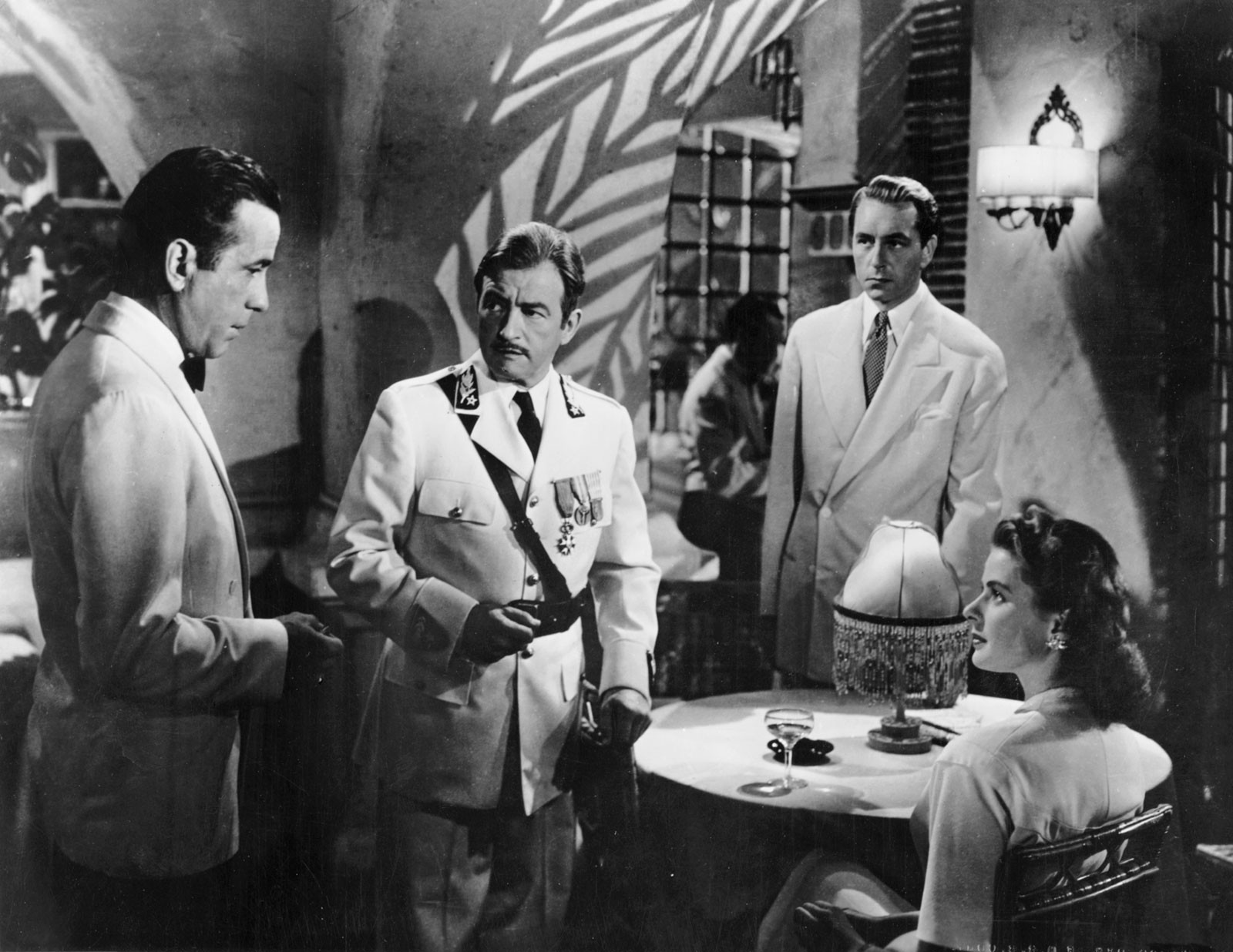

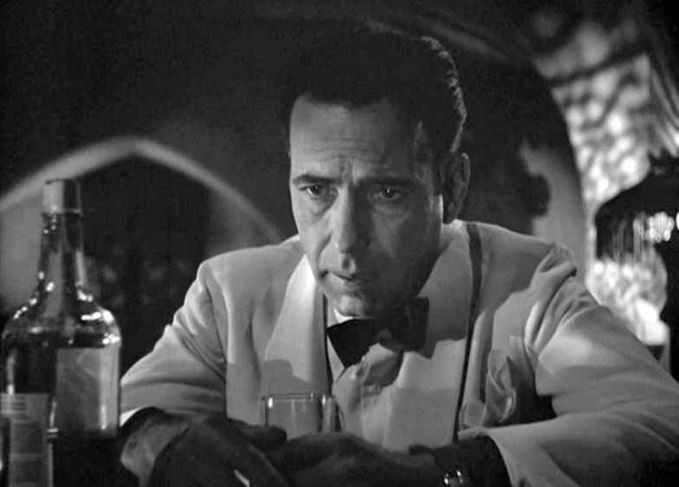

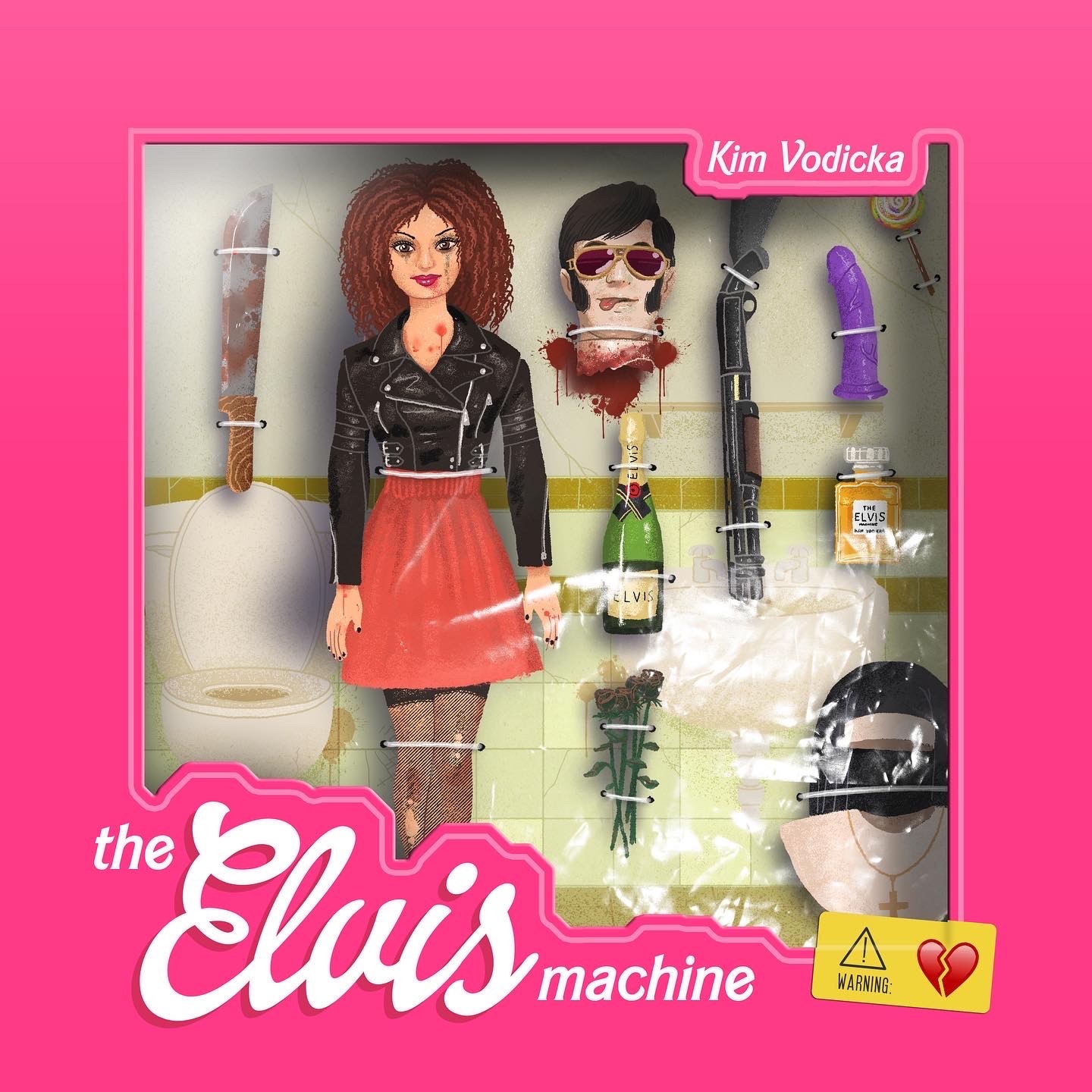 Book cover art and design by Joel Amat Güell
Book cover art and design by Joel Amat Güell 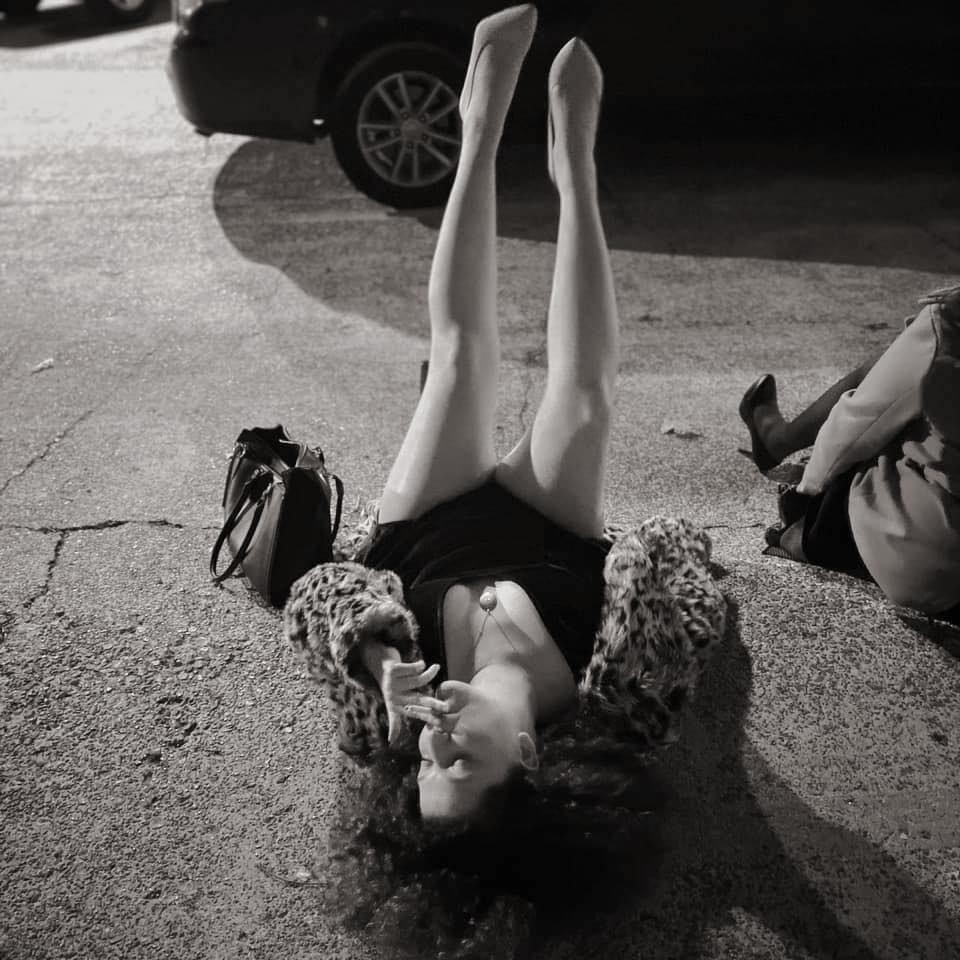 Kim McCarthy
Kim McCarthy  Kim McCarthy
Kim McCarthy 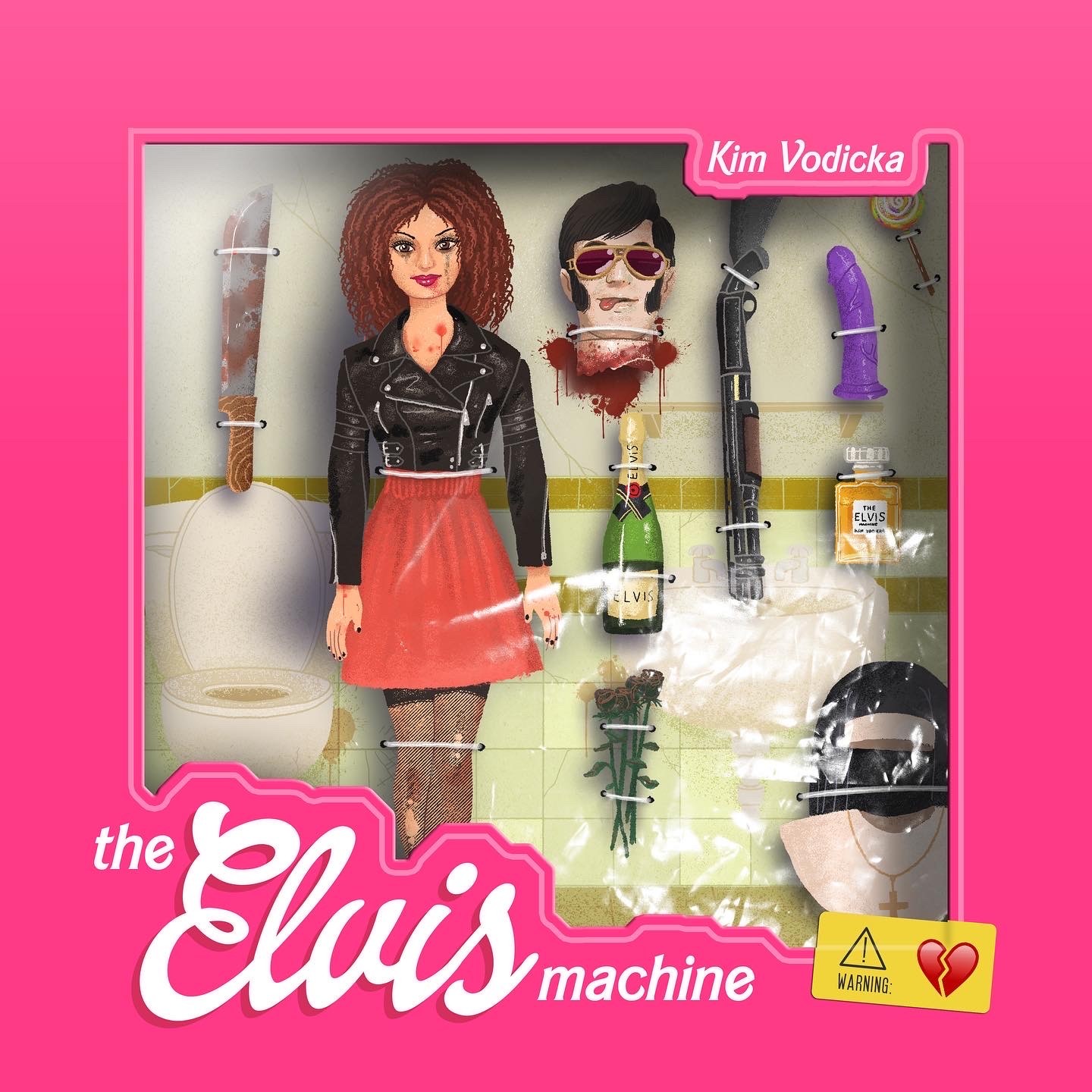 Book cover art and design by Joel Amat Güell
Book cover art and design by Joel Amat Güell